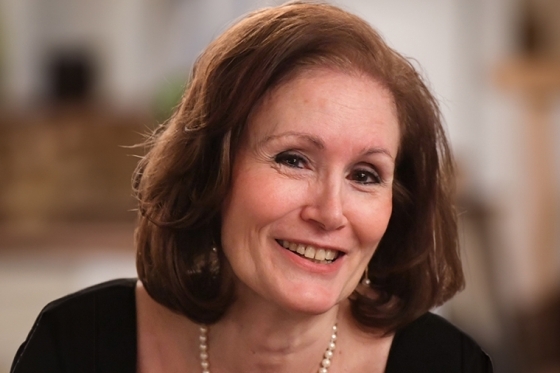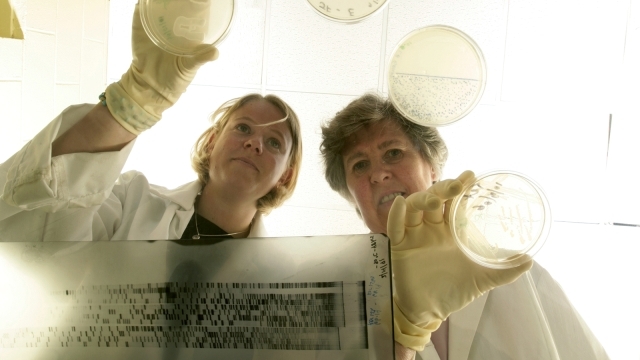

UG
Clinical Laboratory Sciences, Bachelor of Science
70% of medical decisions depend on laboratory test results performed by clinical laboratory scientists. -CDC
- Home
- Academics
- Majors and Programs of Study
- Clinical Laboratory Sciences, Bachelor of Science
The clinical laboratory sciences program is an accredited undergraduate degree achieving a Bachelor of Sciences that leads to national board certification, from the American Society for Clinical Pathology (ASCP), and NYS licensure.
Medical Laboratory Scientists (MLS), also known as Clinical Laboratory Technologists, are nationally certified healthcare professionals who aid in the detection, diagnosis, and treatment of disease. An undergraduate degree in clinical laboratory sciences involves an extensive theoretical and experiential knowledge base through clinical internships at affiliated hospitals and reference laboratories.
The Clinical Laboratory Sciences program within the College of Pharmacy and Health Sciences is committed to a student-centered inclusive pedagogical model that supports student success, personal, and professional development. Our graduates are equipped with the tools to become leaders in their respective fields who work effectively in interprofessional collaborative environments.
- Degree Type
- BS
- Area of Interest
- Nursing, Pharmacy & Health Sciences
- Associated Colleges or Schools
- Program Location
- Queens Campus
- Required Credit Hours
- 138
Learning Outcomes
Students perform laboratory procedures that support the development of critical independent judgment:
- Recognize principles of theory and applications of clinical methodology
- Follow guidelines to procedural specimen collection, integrity, analysis, and preservation
- Analyze data, evaluate, and interpret test results
- Maintain complex sophisticated clinical analyzers and laboratory equipment
- Troubleshoot discrepancies and analytical problems
- Observe case studies and provider consultations
- Interprofessional collaboration with other healthcare professionals
- Conduct research and validate new test methods
- Maintain quality assurance and safety standards
- Demonstrate ethics and professionalism while interacting with peers, faculty, staff and patients
- Adhere to the strict codes of patient confidentiality
Mission Statement
The Clinical Laboratory Sciences program at St. John’s University strives to prepare our students with the highest quality education, technical abilities, and professional attitudes necessary to be integral members of the healthcare team as clinical laboratory scientists. Students will acquire skills to practice as ethical and competent professionals, maintain the strictest confidence in patient matters and recognize their responsibility for the betterment of human welfare.
Program Contact
Yon Choi-Gomes, M.A. Ed, MLS(ASCP)
Program Director
[email protected]
718-990-8449
Program Effectiveness and Outcomes
The Program Effectiveness and Outcomes data include the ASCP national credentialing examination pass rate, job placement rate, and program completion rate reported annually over the last three years.
Outcomes
Results of the ASCP national certification exam (pass rate within the 1st year of graduation)
| Year | Certification Pass Rate | Graduation Rate | Employment Rate | Attrition |
|---|---|---|---|---|
| 2022 | 100% | 100% | 100% | 0% |
| 2023 | 100% | 100% | 100% | 0% |
| 2024 | 100% | 100% | 100% | 66.6% |
| 2025 | 100% | 100% | 86% | 0% |
Featured Faculty
Get to know us! Our experienced faculty in the clinical laboratory is here to help you.

-
Assistant Professor,
- Industry Professional
Department
Health Professions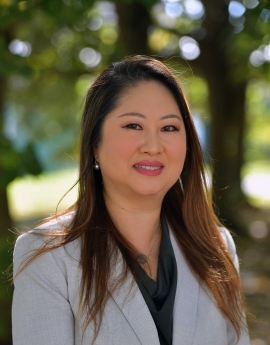
- Assistant Professor/Industry Professional
Department
Health Professions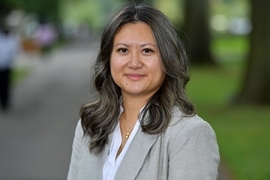
- Assistant Professor/Industry Professional
Department
Health ProfessionsCurriculum and Information
The clinical laboratory sciences program holds accreditation through the National Accrediting Agency for Clinical Laboratory Sciences (NAACLS), 5600 N. River Rd., Suite 720, Rosemont, IL 60018. The most recent accreditation visit extended accreditation until 2027.
Graduates of the clinical laboratory sciences program receive a Bachelor of Science degree and are eligible to sit for the American Society for Clinical Pathology (ASCP) national certification exam. This certification is recognized across the country and enables graduates to practice in any state.
Successful completion of the courses leading to the Bachelor of Science in Clinical Laboratory Sciences and passing the ASCP national certification exam allow graduates to apply to the New York State Department of Education for a license to practice as a clinical laboratory technologist. In addition, graduates who go on to practice in other states with licensure laws are eligible to apply for that state’s license, based on passing the certification exam.
Professional licensure and certification requirements often vary from state to state. St. John’s University has not determined requirements for individual states beyond New York. If you reside or plan to reside outside New York you are strongly encouraged to contact the appropriate state licensing agency in that state to seek information and guidance before beginning the program.
To earn the Bachelor of Science degree in Clinical Laboratory Sciences, students complete 138 credits, including core, major-sequence and elective requirements, as outlined below. For more information about courses, please see the College of Pharmacy and Health Sciences section of our Undergraduate Bulletin.
The faculty expressly reserves the right to make alterations in the curriculum consistent with the profession's needs.
First Year
Fall Semester
| ENG 1000C | Composition | 3 |
| MTH 1250C | Statistics | 3 |
| CHE 1110, 1111, 1112 | Chem/Org I | 4 |
| ALH 2101 | Intro to Clinical Laboratory Science | 2 |
| DNY 1000C | Discover NY | 3 |
| THE 1000C | Christianity | 3 |
| TOTAL | 18 |
Spring Semester
| ENG 1100C | Literature | 3 |
| MTH 1260C | Calculus | 3 |
| CHE 1120, 1121, 1122 | Chem/Org II | 3 |
| BIO 2000 | General Biology 1 | 3 |
| BIO 2001L | General Biology 1 Lab | 1 |
| PHI 1000C | Human Person | 3 |
| TOTAL | 17 |
Second Year
Fall Semester
| CHE 1130, 1131, 1132 | Chem/Org III | 4 |
| PHY Elective | Physics | 3 |
| PHS 3103 | A& P 1 | 3 |
| PHI 2200/2240 | Ethics | 3 |
| PHS 3104 | A & P 1 Lab | 1 |
| Lang 1/LAC 1000 | Lang or Lang & Culture | 3 |
| TOTAL | 15 |
Spring Semester
| SOC | Any Psych, Sociology, Anthro elective | 3 |
| PHS 3105 | A&P 2 | 3 |
| PHS 2101 | Public Health | 3 |
| PHS 3101 | General Pathology | 3 |
| PHI 3000C | Metaphysics | 3 |
| Lang 2/Art/ Music | 3 | |
| TOTAL | 18 |
Third Year
Fall Semester
| TOX 4413 | Quant & Analytical Toxicology | 3 |
| TOX 4414 | Quant & Analytical Toxicology | 2 |
| TOX 1401 | Toxigenomics | 3 |
| TOX 1402 | Toxigenomics Lab | 1 |
| THE 2XXX | Theology Elective | 3 |
| SPE 1000C | Speech | 3 |
| Language I or LAC 1000C | 3 | |
| TOTAL | 18 |
Spring Semester
| BIO 2280/1 | Microbiology | 4 |
| BIO 3460/ 1 | Immunology | 4 |
| THE 3XXX | Theo 3000 | 3 |
| PHS 4202 | Clinical Chemistry | 3 |
| HIS 1000C | 3 | |
| TOTAL | 17 |
Fourth Year
Summer Semester
| ALH 4140 | Transition to the Clinical Lab | 2 |
Fall Semester
| ALH 4151 | Clinical Bacteriology I | 3 |
| ALH 4152 | Clinical Immunology I | 1 |
| ALH 4153 | Clinical Immunohematology I | 2 |
| ALH 4154 | Clinical Hematology I | 3 |
| ALH 4155 | App, Anal, Lab Practice in Clin Chem I | 4 |
| ALH 4156 | Urinalysis & Body Fluids | 2 |
| ALH 4157 | Mycology & Parasitology I | 2 |
| TOTAL | 17 |
Spring Semester
| ALH 4161 | Clinical Bacteriology I | 3 |
| ALH 4162 | Clinical Immunology II | 1 |
| ALH 4163 | Clinical Immunohematology II | 2 |
| ALH 4164 | Clinical Hematology II | 2 |
| ALH 4165 | App. Anal & Lab Practice in Cl Chem II | 4 |
| ALH 4166 | Urinalysis & Body Fluids II | 2 |
| ALH 4167 | Mycology & Parasitology II | 2 |
| ALH 4168 | Clinical Ed. Mgmt & Research | 1 |
| TOTAL | 17 |
For admission to the professional phase of St. John's University Program of Clinical Laboratory Sciences, the prospective student must be familiar with progression criteria.
Students must maintain a 2.30 overall (science and math) GPA in the pre-professional courses to progress within their major. A 2.30 or higher overall GPA is required for a student to progress into the Clinical Laboratory Sciences program's professional phase. Before entering the professional year, students are required to complete an application packet and subsequently participate in an interview as part of their progression process. Acceptance into the professional year is contingent upon the fulfillment of all established criteria. All pre-professional courses must be completed before entering the program's professional phase.
Within the professional phase, students must maintain an overall GPA of 2.30, earn a letter grade of C+ or greater in each didactic and clinical course, and adhere to the attendance policy to progress from semester to semester.
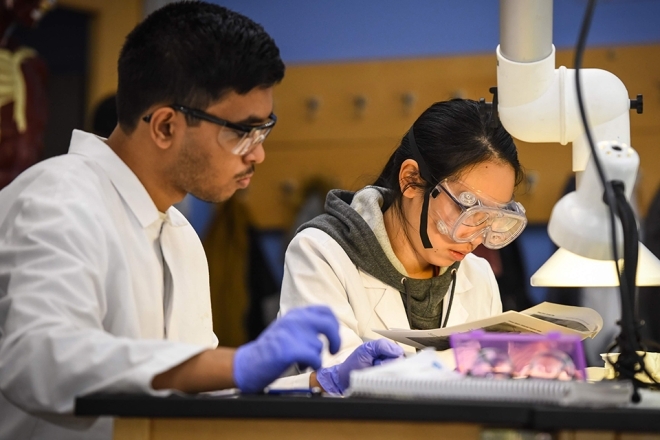
Workforce Projections
According to the 2022 Health Resources and Services Administration’s Allied Health Workforce Projections, the Medical and Clinical Laboratory Technologists workforce would need to increase by approximately 19%, by 2030.

How much does a Clinical Laboratory Scientist make?
Clinical Laboratory Scientist Salary in New York
Our Program
Success at St. John's University
Award-Winning Clinical Laboratory Scientist Reflects on 40-Year Career
Angela Tomei Robinson ‘79MT, ‘85GP recently retired after a career in clinical health science that spanned more than 40 years. As a student in the College of Pharmacy and Allied Health Professions (now called the College of Pharmacy and Health Sciences (CPHS)), she was the first medical technology student to be named a member of the President’s Society, the University’s highest honor for undergraduates. She was also awarded the Scientific Products New York State Outstanding Medical Technology Student of the Year Award.
Highlight
St. John’s provided me with a disciplined education and the background needed to evolve as a professional. I was able to intern at a local hospital and the clinical internships in chemistry/blood banking/microbiology/hematology captivated me. There was no turning back.
Interested in Nursing, Pharmacy & Health Sciences, but not sure if Clinical Laboratory Sciences, Bachelor of Science is right for you?
Related Programs
GR
Prepare for the high demand for audiologists with a Doctor of Audiology degree from St. John's!
- Queens Campus
GR
Doctorate (Ph.D.) basic science research in Pharmaceutical Sciences specializing in one of Industrial Pharmacy, Medicinal Chemistry, Pharmacology or Toxicology
- Queens Campus
GR
Master’s level degree in Pharmaceutical Sciences specializing in one of Industrial Pharmacy, Medicinal Chemistry or Pharmacology with an optional basic research component.
- Queens Campus
UG
This program is a rigorous course of study, combining didactic and laboratory-based academic instruction with clinical training at leading New York-area hospitals, medical centers, and private medical practices.
- Queens Campus
GR
The Master of Arts program in Speech-Language Pathology is designed to provide the academic and clinical education that graduates need to meet the profession’s existing and emerging demands.
- Queens Campus
UG
Our toxicology degree is a STEM program examining the effects of chemicals on human health and the environment.
- Queens Campus
GR
Toxicology is the study of the adverse effects of chemical, physical or biological agents on people, animals and the environment with the goal of enhancing the overall safety and health of the public. The program prepares students for careers in research, academia, regulatory agencies and industry.
- Queens Campus
Take the Next Step

Explore Affordability
The Office of Student Financial Services is committed to providing students and their families with the information they need to navigate and understand the financial aid and payment process.
Apply to St. John's
St. John’s offers a free online application for all 100+ undergraduate programs, and graduate applications carry a low cost for most programs.

